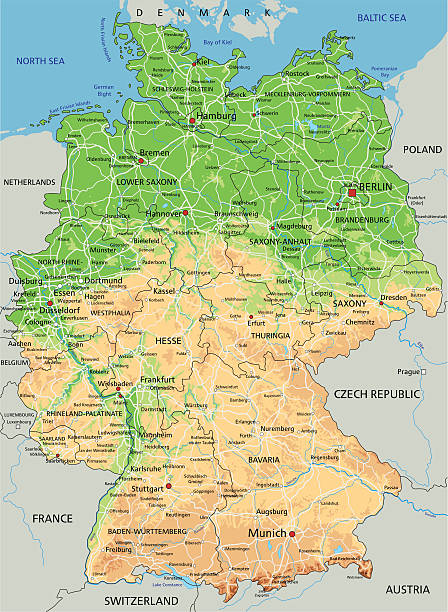Germany / DEUTSCHLAND
Germany needs energy – especially renewables.
Germany aims to become climate-neutral by 2045, and the share of renewable energies would have to nearly double by 2030 – compared to 2021. To achieve this, the expansion rate would have to triple. The German government is therefore accelerating the energy transition.
And the energy transition is indeed gaining momentum: In the first half of 2024, 57 percent of electricity consumption was already covered by renewable energies, so the expansion rate is increasing.
Along with the efficient use of primary energy, renewable energies in Germany are the most important pillar of a sustainable energy policy and the energy transition. Renewable energy sources include solar, wind, and marine energy, as well as hydropower, bioenergy, and geothermal energy.
In the 2025 coalition agreement, the CDU/CSU and SPD committed to the German and European climate targets and Germany's climate neutrality by 2045. To this end, the coalition partners particularly want to further advance the expansion of renewable energies and maintain the EU Emissions Trading System. At the same time, costs for companies and citizens are to be reduced.
In detail, the coalition has committed to a number of targets, the implementation and design of which remain to be seen. Many measures already initiated under the previous government will be continued and adjusted by the coalition :
* Increasing energy supply
* Revising the power plant strategy
* Accelerating approval procedures
* Expanding storage facilities
* Reducing energy prices
* Financing through the special fund and the investment fund
Our contribution to this is to supply more parts of the country with renewable electricity. We are also working hard here and have several projects available that we are offering as fully constructed and ready for operation.

Deutschland braucht Energie - vor allem Erneuerbare
Deutschland soll bis 2045 klimaneutral werden, bis 2030 müßte sich der Anteil der Erneuerbaren Energien fast verdoppeln - ausgehend von 2021. Dafür muß sich die Ausbaugeschwindigkeit sogar verdreifachen. Die Bundesregierung macht deshalb mehr Tempo bei der Energiewende.
Und die Energiewende nimmt tatsächlich Fahrt auf : Im ersten Halbjahr 2024 wurden bereits 57 Prozent des verbrauchten Stroms durch Erneuerbare Energien gedeckt, das Ausbau-Tempo steigt also.
Erneuerbare Energien in Deutschland sind neben der effizienten Nutzung von Primärenergie die wichtigste Säule einer nachhaltigen Energiepolitik und der Energiewende. Als erneuerbare Energiequellen gelten Sonnen-, Wind- und Meeresenergie sowie Wasserkraft, Bioenergie und Geothermie.
Im Koalitionsvertrag 2025 bekennen sich Union und SPD zu den deutschen und europäischen Klimazielen und der Klimaneutralität Deutschlands bis 2045. Dafür möchten die Koalitionspartner insbesondere den Ausbau der erneuerbaren Energien weiter vorantreiben und halten am EU-Emissionshandel fest. Gleichzeitig sollen die Kosten für Unternehmen und Bürger gesenkt werden.
Im Einzelnen hat sich die Koalition auf eine Reihe von Zielbildern festgelegt, deren Umsetzung und Ausgestaltung noch abzuwarten bleibt. Viele bisher bereits unter der alten Regierung angestoßene Maßnahmen werden durch die Koalition fortgesetzt und nachjustiert
* Erhöhung des Energieangebots
* Überarbeitung der Kraftwerkstrategie
* Beschleunigung von Genehmigungsverfahren
* Speicherausbau
* Senkung der Energiepreise


